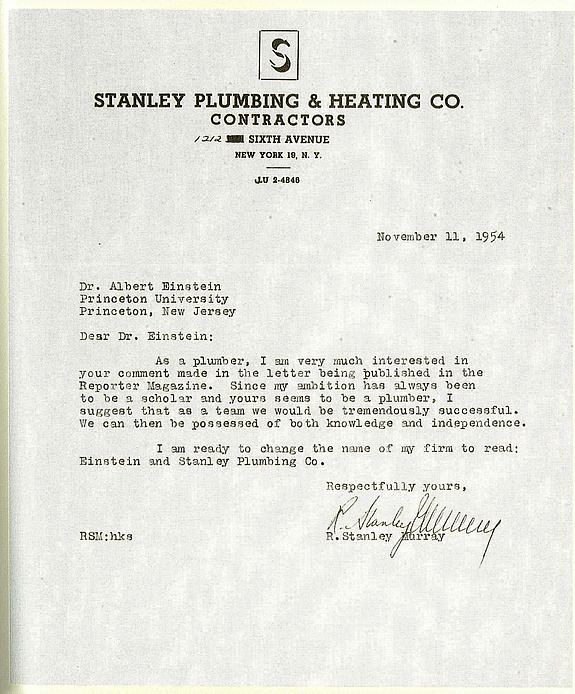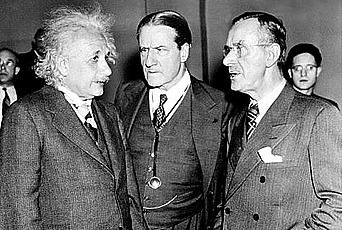Einstein, Plumbers, and McCarthyism

In November 1954, Albert Einstein wrote a letter to a magazine in which he declared that, were he a young man again, he would not try to become a scientist: “I would rather choose to be a plumber or a peddler in the hope to find that modest degree of independence still available under present circumstances.” Around the United States, plumbers responded. The famous physicist was offered membership in the Chicago plumbers union, and Stanley Murray, a New York plumber, wrote to him: “Since my ambition has always been to be a scholar and yours seems to be a plumber, I suggest that as a team we would be tremendously successful. We can then be possessed by both knowledge and independence. I am ready to change the name of my firm to read: Einstein and Stanley Plumbing Co.”
Einstein was only half-joking, however, when he issued his statement. The physicist sincerely considered that the political climate in the country was becoming increasingly hostile to scientists and teachers. Our own troubled times have many aspects in common with the dreadful period of the McCarthy investigations: the attacks on the freedom of academics, teachers, and the press, the silencing and censorship of government workers, the idea that the United States is threatened by certain creeds. It is worth describing the dire sequence of past events, and learning from Einstein’s clairvoyant and courageous response to them, in order to best address the present situation.
A campaign of untruth
On February 9, 1950, Senator Joseph McCarthy from Wisconsin announced that he had a list of 205 workers of the State Department who were members of the Communist Party. The next day, a journalist asked to see the list. But McCarthy could not find it; his explanation was that he had left it in another suit. The Senate committee that was created to investigate these claims concluded a few months later that McCarthy’s accusations represented “perhaps the most nefarious campaign of half-truths and untruth in the history of this republic.” Historians are now sure there never was such a list.
Nevertheless, at the time, mainstream Republicans ignored the findings of the Senate committee. They saw McCarthy’s tactics as something that would help them take control of the White House, after a sixteen-year absence. They invited him to meetings where he ranted about the “plot” at the highest levels of government. McCarthy’s staff also circulated a doctored photograph, purportedly showing the leader of the Senate committee in close conversation with leaders of the Communist Party.
The 1952 elections were a great success for the Republicans, who gained control of the White House, the House of Representatives, and the Senate. Senator McCarthy’s power was unchecked. During a speech on the Senate floor, he piled hundreds of documents on a table, claiming they contained evidence of the infiltration. No one was permitted to examine them. McCarthy was nominated Chair of the Permanent Subcommittee on Investigations, and he extended the loyalty inquisition to many sectors, foremost among them, the nation’s educational system. As a former president of the University of Chicago noted, “The entire teaching profession of the U.S. is now intimidated.”
Teachers at risk
William Frauenglass, a teacher in a Brooklyn high school, was called before the Senate subcommittee in April 1953. In his case, the accusation of disloyalty stemmed from a course he had given six years before, in a session for other teachers organized by the Board of Education. It was called Techniques of Intercultural Teaching, and it reviewed methods to “help ease intercultural or interracial tensions” in the classroom. One witness called upon by the committee declared that such teachings were “against the interests of the United States.” Frauenglass was shocked: “Imagine such an accusation when one of the fundamental objectives of public education is the creation of intercultural understanding among our many minorities!” he wrote in a later letter. The teacher was also asked which organizations he belonged to, and he refused to answer.
Frauenglass needed help and decided to ask it from someone he greatly respected, who had recently described himself as an “incorrigible nonconformist”: Albert Einstein, Professor of Theoretical Physics at the Institute for Advanced Study in Princeton, undoubtedly the most famous scientist in the world, and also a notorious antiracist and antiwar activist. “A statement from you would be most helpful in rallying educators and the public to meet this new obscurantist attack,” Frauenglass wrote. Einstein obliged. His May 16, 1953, letter of reply—which, he specified, “need not be considered confidential”—was quoted extensively by the New York Times:
The reactionary politicians have managed to instill suspicion of all intellectual efforts into the public by dangling before their eyes a danger from without. Having succeeded so far, they are now proceeding to suppress the freedom of teaching and to deprive of their positions all those who do not prove submissive, i.e., to starve them.
Einstein strongly advised the teacher to refuse to testify any longer. He should be prepared, Einstein wrote, “for the sacrifice of his personal welfare in the interest of the cultural welfare of his country.” The physicist added, “This kind of inquisition violates the spirit of the Constitution. If enough people are ready to take this grave step, they will be successful. If not, then the intellectuals of this country deserve nothing better than the slavery which is intended for them.” When Frauenglass and Einstein met in Princeton a few days later, Einstein said he himself was ready to go to jail for these principles. Frauenglass followed his advice. As was foreseen, he was fired from his job, but nevertheless thanked the scientist for a “historic letter”: “Its echoes are still reverberating throughout the world.”
The right to search for truth
McCarthy was quick to react to Einstein’s stand. He told the media that whether his “name is Einstein or John Jones,” the giver of such advice was undoubtedly an “enemy of America,” “a disloyal American,” and “not a good American.” But Einstein was in no way deterred. In remarks he made to an assembly of lawyers, he continued to criticize practices “which have become incomprehensible to the rest of civilized mankind and exposed our country to ridicule.” And he warned, “the existence and validity of human rights are not written in the stars.”
Einstein was concerned about the curtailing of academic freedom. In a public statement in March 1954, he advocated for “the right to search for truth and to publish and teach what one holds to be true.” He regretted that in this dark age “freedom of teaching, mutual exchange of opinions, and freedom of press and other media of communication are encroached upon or obstructed,” adding that “this is a state of affairs which a democratic government cannot survive in the long run.”
For some, these statements were proof of Einstein’s disloyalty and continued foreignness––he the German Jew who had been granted American citizenship in 1940. In March 1954, a woman from Los Angeles wrote to the Director of the Institute for Advanced Study: “The man needs lessons in Americanism. I have no patience with this idea that a person who has performed a great deed or discovered something, should be excused from what citizens of U.S.A. must conform to, or that they need not account for questionable acts of theirs.” A man from New York City put it more bluntly: “I suggest he move to Russia—and soon! We don’t need him.”
The Director of the Institute at the time, Robert Oppenheimer, himself a target of McCarthy’s inquisition, remained steadfast in his support of his famous colleague. Six months later, in December 1954, McCarthy was finally “condemned” by a large majority of his Senate colleagues for “contemptuous” and “reprehensible” conduct. Of course, Einstein’s actions did not by themselves cause McCarthy’s downfall. But they certainly facilitated it, by reaffirming essential principles that date back to the Enlightenment, and by empowering many others to keep up the continuing fight to protect democracy.
References
Letter from R. Stanley Murray, plumber, to Albert Einstein, November 11, 1954. Ze'ev Rosenkranz, The Einstein Scrapbook (Baltimore and London: The Johns Hopkins University Press, 2002).
“Plumber Einstein Happy,” New York Times, November 20, 1954.
Geoffrey R. Stone, “Free Speech in the Age of McCarthy: A Cautionary Tale,” California Law Review 93 (2005): 1387–1412.
Leonard Buder, “‘Refuse to Testify,’ Einstein Advises Intellectuals Called In by Congress,” New York Times, June 12, 1953.
“Einstein Criticized: McCarthy Says Giver of Such Advice Is ‘Enemy of America,’” New York Times, June 14, 1953.
“McCarthy Asserts Silence Convicts,” New York Times, June 22, 1953.
“Einstein Envisions Rights, Freedom Tie,” New York Times, February 21, 1954.
Albert Einstein, Answers to the Questions of the Emergency Civil Liberties Committee, March 10, 1954 (Director’s Office: Faculty files: Box 9: Einstein, Albert - Emergency Civil Liberties Committee. Shelby White and Leon Levy Archives Center, Institute for Advanced Study).
Two letters to the Director of the IAS, March 11, 1954 (ibid.).
Fred Jerome, The Einstein File: J. Edgar Hoover's Secret War Against the World's Most Famous Scientist (New York: St. Martin’s Press, 2002).
Fred Jerome and Rodger Taylor, Einstein on Race and Racism (New Brunswick: Rutgers University Press, 2005).


